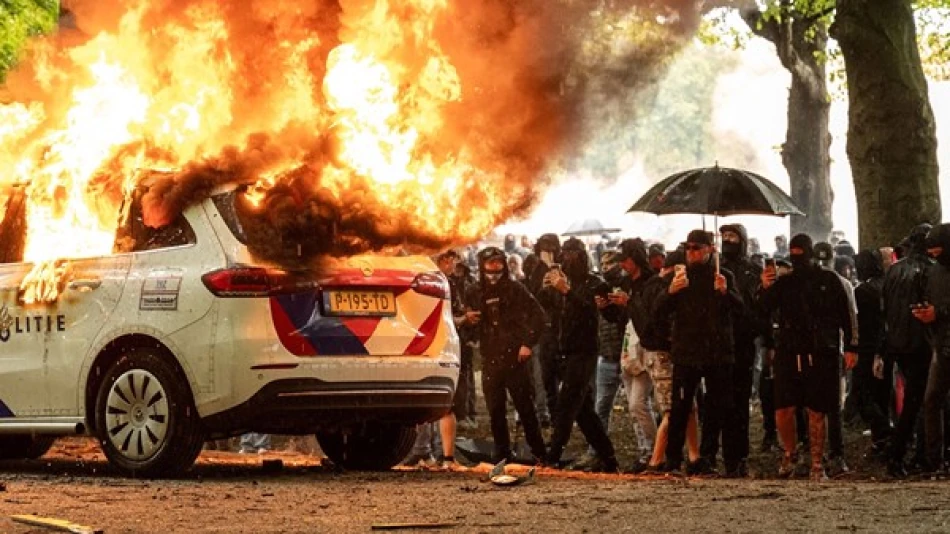
Clashes Erupt as Anti-Immigration Protesters Confront Police in the Netherlands
Anti-Immigration Riots Rock The Hague as Netherlands Faces Growing Political Tensions
Violent clashes erupted in The Hague on Saturday as approximately 1,500 anti-immigration protesters confronted Dutch police on a major highway, forcing authorities to deploy water cannons and tear gas. The unrest, which included attacks on the offices of the liberal D66 party, signals escalating political polarization in the Netherlands following recent electoral gains by far-right parties across Europe.
Violence Escalates on The Hague Streets
What began as a demonstration quickly spiraled into confrontation as protesters pelted police with bottles and stones along a highway cutting through the Dutch capital. The situation deteriorated further when demonstrators set fire to a police vehicle and targeted the offices of the Social Democratic Party (D66), smashing windows in what appeared to be a coordinated attack on the liberal political establishment.
Dutch police responded with crowd control measures including water cannons and tear gas, ultimately making an undisclosed number of arrests. The intensity of the violence underscores the deepening divisions over immigration policy that have become a defining feature of European politics in recent years.
Political Parties Under Siege
The targeting of D66 offices represents a troubling escalation in political intimidation tactics. Rob Jetten, the party's leader, responded defiantly on social media platform X, declaring: "Stay away from political parties. If you think you can intimidate us, you're out of luck. We will never allow extremist rioters to steal our beautiful country."
Fortunately, no party staff were present during the attack, according to D66 officials. However, the incident raises serious questions about the safety of democratic institutions and political representatives in the Netherlands.
Netherlands Joins European Immigration Backlash
Saturday's riots reflect broader trends across Europe, where immigration has become the dominant political flashpoint. The Netherlands has experienced significant demographic changes over recent decades, with immigration from both EU and non-EU countries reshaping urban centers like Amsterdam, Rotterdam, and The Hague.
This unrest comes as far-right parties have gained ground across the continent. In Germany, the Alternative for Germany (AfD) has surged in polls, while Italy's Giorgia Meloni rode anti-immigration sentiment to power. France continues to grapple with similar tensions, and even traditionally liberal Scandinavian countries have tightened immigration policies.
Political Implications for Dutch Democracy
The violence targeting D66 is particularly significant given the party's role as a centrist, pro-European voice in Dutch politics. As a member of the current coalition government, D66 has supported relatively liberal immigration policies, making it a natural target for far-right activists.
The willingness of protesters to engage in direct political intimidation suggests that traditional democratic discourse may be breaking down. This pattern mirrors concerning developments in other Western democracies, where political violence has become increasingly normalized.
Security Challenges Ahead
For Dutch authorities, Saturday's events represent a significant security challenge. The scale of the demonstration—1,500 participants—and the level of organization required to target specific political offices suggest this was not a spontaneous outburst but a planned action by organized groups.
The incident will likely prompt discussions about enhanced security for political parties and their facilities, potentially changing the traditionally open nature of Dutch political culture. It also raises questions about how effectively security services are monitoring extremist groups and their activities.
As Europe continues to grapple with immigration pressures and rising populist movements, the Netherlands now finds itself at the center of a broader struggle over the future of liberal democracy on the continent. The response from both authorities and mainstream political parties will be crucial in determining whether such violence becomes a recurring feature of Dutch political life.
Most Viewed News

 Layla Al Mansoori
Layla Al Mansoori






